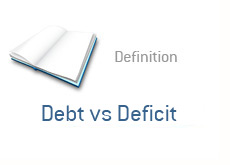Definition of Debt vs Deficit
What is the difference between a debt and a deficit?
Many people confuse debts with deficits, and vice versa.
Each year, a government (let's say the US Federal government for this example) takes in and spends money.
 The government takes in revenues, or receipts, through income taxes, social insurance taxes, etc.
The government takes in revenues, or receipts, through income taxes, social insurance taxes, etc. The government also spends money every year (also known as outlays) on a variety of different things, including social security, defense spending, etc. etc.
If the government spends more than it takes in over the course of one year, then it has run a deficit. A deficit applies to just one year.
So, if the government takes in $10 trillion dollars but spends $13 trillion dollars in one year, then it has run a $3 trillion dollar deficit.
When the government runs a deficit, then it must borrow money to make up the difference.
A debt is completely different. Think of debt as accumulated deficits.
If the government has to borrow money every year, then its debt will continue to grow year-after-year. This debt does not disappear unless the government elects to try and pay it down (rare occurrence).
The debt usually grows year-after-year. With each additional deficit, the debt continues to grow.
Some people think that if a government takes in more money than it spends in one year, then it suddenly doesn't have any debt. This is not the case. This simply means that the government has managed to run a surplus (opposite of deficit), but any accumulated debt is still there.
The US government is expected to run a deficit of many hundreds of billions of dollars this year. This is in addition to the debt that the federal government has already accumulated since its inception.
--
Davemanuel.com Articles That Mention Debt vs Deficit:
None
